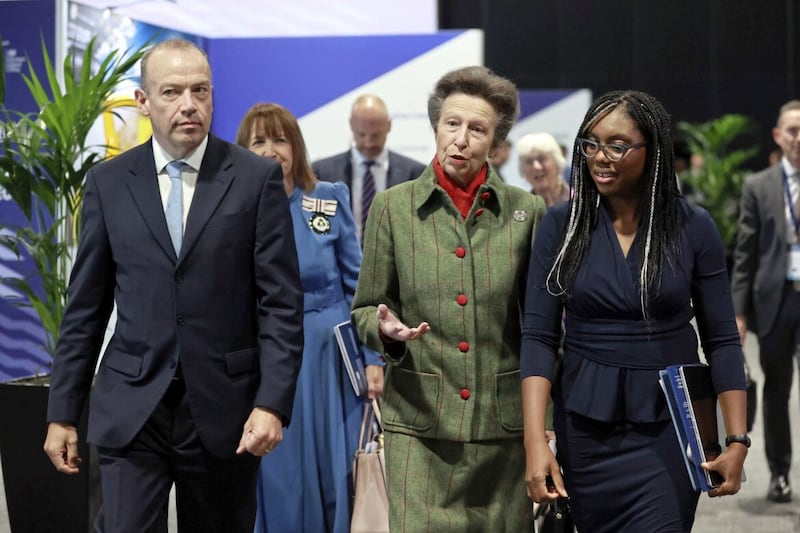AS we embark on a new year, many firms in Northern Ireland are asking themselves questions about our economic future. The region is reported to have entered into a technical recession in the latter part of last year and the CBI’s UK-wide economic forecast shows that the current downturn will likely last until the end of 2023.
So far so gloomy. But, of course, different sectors have had vastly different experiences. Take the food sector – it reported a record year even though consumer preferences and shopping habits continued to adjust, with people moving away from big weekly shops to smaller more frequent shopping patterns. That also has led to a reduction of waste and customers using a broader range of outlets as they chase better value. Producers have further told me that food inflation prices appear to have peaked, and they don’t anticipate further rises in the year ahead.
In construction too, while the majority of firms still rely on more the buoyant GB and RoI markets, we’re seeing companies start to talk about an easing of supply chain issues. Many manufacturers too have welcomed a reduction in wholesale energy prices that should provide some relief in the year ahead.
All good news. But with big questions remaining around next winter’s energy supply, we can’t afford to get too far ahead of ourselves. Storage, capacity, interconnectedness, and disruption resulting from Russia’s invasion of Ukraine, remain live issues. All of that, added to the continued cost-of-living crisis, likely means we likely face another tough year ahead.
However, at the CBI, we’re optimistic that there are ways to ease some of the main pressures on business. Undoubtedly there is still a lot of untapped growth potential – the important question is how to get the economy growing again, even in these times of profound difficulty.
Amidst external uncertainty, the CBI’s priorities for the next twelve months are crystal clear. It’s crucial that we ensure our economic outlook improves, not worsens beyond the predicted UK contraction of 0.4, and gets back to growth.
In 2023, we will continue to challenge some of the barriers holding back firms, because there are plenty of steps government can take to support business – even against a background of tight monetary and fiscal policy.
While the announcement of the Energy Bills Discount Scheme will be a help to many businesses, for other firms, high energy prices will likely continue to weigh on investment intentions.
We all recognise that the government cannot support widespread energy bills indefinitely. So the real question is how to we increase self-sufficiency across the island of Ireland in terms of energy supply – for example: increasing renewable generation giving a route to market for hydrogen, and maximising bio-methane solutions. Essentially, in the long-run, the economy needs to be much more resilient to geo-political risks.
We also need to solve our labour shortages. The increase of economic inactivity, in part resulting from the Covid-19 pandemic, has had a considerable negative effect on workforce availability. We don’t have enough people for existing vacancies, and many of those seeking employment lack the skills to meet current demand. That’s why CBI will continue to push for greater flexibility in the Apprenticeship Levy.
We urgently need a more flexible and dynamic skills fund for Northern Ireland that allows firms to make use of their contributions to better upskill and re-skill workers in-line with local needs. One large employer reported to me last week that they are still paying £500,000 a year into the Apprenticeship Levy and getting £40,000 back to use for training their workforce. That’s not sustainable or effective in the long-term.
Building on the skills of our workforce would allow us to bridge a lot of the gaps we’re currently facing. But in the short term we also need to look at economic migration. We can tackle some of our existing shortages through fixed-term visas and an updated shortages occupation list in those areas where – in the near future – we aren’t going to get enough people and skills at home.
Green growth also has to return to the top of the agenda. Decarbonisation is one of the areas offering the biggest prizes for firms. But we need government to create an environment where firms in Northern Ireland and beyond are empowered to accelerate their energy transition, and to pursue major green investment projects. The ambition is there, but it needs to be matched by confidence-boosting government action.
Economic growth is indisputably the way forward. It’s our chance to improve our economic outlook, public services and living standards – and we can’t lose that focus. Of course, we will only achieve the best possible outcomes when businesses, a sitting Executive and the UK and Irish governments are aligned on the most important questions.
Despite political uncertainty, the CBI is positive that this year, like many years before, the resilience of business will help to carry us through hard times.
:: Angela McGowan is director of CBI Northern Ireland









